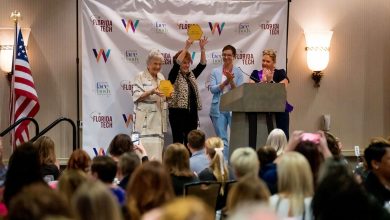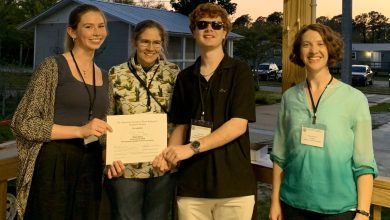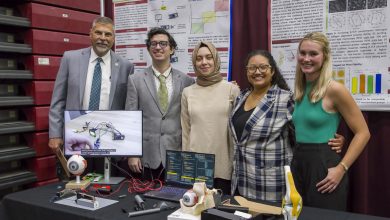High School Ethics Competition
Nine Brevard and Seminole county high schools are participating in the ninth annual Business Ethics Competition sponsored by the College of Business on
March 11, 2005. Teams will be representing Bayside High School, Eau Gallie High School, Merritt Island High School, Satellite High School, Cocoa Beach High
School, Melbourne High School, Melbourne Central Catholic High School, Astronaut High School and Lake Brantley High School. Lake Brantley is in Seminole
County and is bringing three teams to the competition. The competition is designed to encourage high school students to explore the subject of ethics,
reflect on how ethical principles are related to the decision-making role of business men and women, and to evaluate the ethical adequacy of actual
decisions made by managers. Students compete as part of two-to-four person teams. Each team analyzes cases based on ethical situations in business and
presents their solutions to a panel of judges comprised of business leaders in the community. Each member of the winning team receives an $8,000 per year
scholarship to the College of Business. Each member of the second place team receives a $6,000 per year scholarship to the College of Business. In
addition, members of the top three teams receive $500 per team member for first place, $250 per team member for second place, and $125 per team member for
third place. The first ethics competition was held in 1997. Teams representing five high schools from Brevard County participated and the Palm Bay High
School team won the inaugural competition. Since then, teams from Melbourne High School, St. Edward”s Upper School, Satellite High School, Astronaut High
School, Melbourne Central Catholic High School and Eau Gallie High School have also earned first place recognition. Other high schools teams, which have
participated, include Florida Air Academy, Bayside, Cocoa, Cocoa Beach, Sebastian River, Crooms Academy, Vero Beach and Covenant Christian. The competition
has several objectives for the students: To allow them to increase their understanding of ethics and to reflect on how it relates to the real business
world; to provide them the opportunity to apply ethical tests to real world situations which have challenged business people and to defend their choices;
to help them further develop their team skills and to experience the challenge and enjoyment of interschool scholastic competition; and to provide the
opportunity for students to meet and interact with experienced business and professional leaders and to discuss the subject of ethics in the world of work.
The competition follows a general format to accomplish these goals. Participating high schools will designate a coach (or coaches) for the competition. The
coach will select a team, with a minimum of two and a maximum of four student members; coaches from participating schools meet in the fall with College of
Business faculty and staff to discuss the ground rules for the upcoming competition. (The competition is always scheduled to coincide with spring break at
the university.) Members of the faculty select a case study that they consider to be both interesting and rich in learning potential. They also develop a
protocol for use by competition judges in evaluating the performance of participating teams. Copies of the case and protocol are mailed to the team coaches
prior to the break for Christmas vacation. Judges are chosen from a large list of volunteers including judges, elected officials, senior attorneys,
top-level executives, health care professionals and educators. Judges express great satisfaction with their participation in the event, and invariably
request to be invited to future competitions. On the morning of the competition, student teams make a 30-minute presentation to their team of judges.
Following the presentation, the judges engage the students in a question and answer session to further explore the ethical considerations which caused them
to arrive at their proposed course of action. At the end of the morning presentations, the judges discuss the presentations and choose three finalist
teams. The team selections are announced at a luncheon hosted by the College of Business. In the afternoon the finalist teams are randomly assigned the
order in which they will present their analysis of a second case. The first team will be given the case immediately after lunch, have one hour to analyze
it, and then present their analysis to the finalist judges. Similarly, the second team will be given the case one hour before they will present it to the
same finalist judges, as will the third team. This case, also selected by members of the College of Business faculty, will be sufficiently brief that it
can be read and analyzed by the team in a one-hour period. In the afternoon competition, the analysis of the case and development of the presentation is an
independent effort which must be done without assistance from the team coach. At the completion of the third presentation, the judges discuss the merits of
each presentation and determine the winners. Finally, the results are announced and the awards are presented. The overall goals are to illuminate the
business and ethical dimensions of a problem and recommend a solution that makes sense ethically from a business perspective. In handling the ethical
issues, the students will be expected to operate within a framework of ethical inquiry that includes moral common sense and critical thinking. Critical
thinking is required when problems require consideration beyond moral common sense and the search is for criteria that will justify the inclusion or
exclusion of common sense norms.




